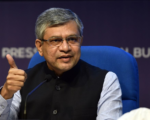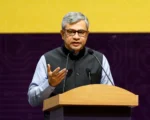The Telecommunications Bill, 2023, has been passed in the Rajya Sabha through a voice vote.
Parliament on Thursday passed a bill that seeks to allow the government to temporarily take control of telecom services in the interest of national security, and provide a non-auction route for the allocation of satellite spectrum.
The Telecommunications Bill, 2023, was approved by the Rajya Sabha through a voice vote. It was passed by the Lok Sabha on Wednesday after a short debate.
The Bill seeks to allow the government to temporarily take control of telecom services in the interest of national security, and provide a non-auction route for the allocation of satellite spectrum.
Parliament on Thursday passed a bill that seeks to allow the government to temporarily take control of telecom services in the interest of national security, and provide a non-auction route for the allocation of satellite spectrum.
The Telecommunications Bill, 2023, was approved by the Rajya Sabha through a voice vote. It was passed by the Lok Sabha on Wednesday after a short debate.
The Bill seeks to allow the government to temporarily take control of telecom services in the interest of national security, and provide a non-auction route for the allocation of satellite spectrum.
Replying to the debate, Communications Minister Ashwini Vaishnaw said the Telecommunications Bill 2023 is being brought keeping in mind the aspirations of the new India to replace two colonial-era laws.
“In the last nine-and-half-years, India’s telecom sector has emerged from a very difficult period marred by scams to become a sunrise sector,” the minister asserted.
During the same period, the number of telecom towers has surged from 6 lakh in 2014 to 25 lakh presently. Additionally, the number of internet broadband users has witnessed remarkable growth, reaching 85 crore today compared to just 1.5 crore before. The swift deployment of 5G technology in India, with a significant portion of the equipment being domestically produced, has been attributed to the leadership of Prime Minister Narendra Modi.














